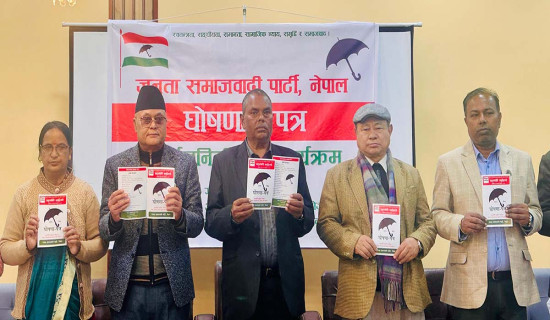- Saturday, 14 February 2026
Intensify Money Laundering Investigation
Nepal is almost sure to fall into ‘greylist’ once again for failing to achieve the desired progress on its anti-money laundering regime. After having monitored Nepal’s money laundering investigation system on a regular basis, the Asia Pacific Group (APG) of the Financial Action Task Force (FATF) has recently signalled that the country may be greylisted soon as the nation has been unable to meet the standards set by the monitoring body and also follow international practices. When a country is listed as high-risk in money laundering, it is under the FATE’s tougher economic supervision and regulation. Any nation can face this situation when its legal framework and anti-money laundering regime are not in compliance with that of the FATF in terms of combating financial crimes like money laundering and terrorist financing.
Being a global anti-money laundering agency, the FATE has the authority to decide whether to greylist a country or give waiver to it. Such a decision is based on the nation’s level of compliance with the FATF’s anti-money laundering system. Nepal was on the FATE’s greylist from 2008 to 2014 as well because the country did not have adequate legal and other institutional frameworks for dealing with financial wrongdoings. Anyway, that move triggered the country to make some progress on the anti-money laundering regime. During that period, the Anti-Money Laundering Act, 2008 was amended while other laws were formulated. That led to the removal of the country from the list.
Obligation
As a member of the FATE, Nepal has the obligation of making expected reforms in the enforcement of anti-money laundering laws, investigation into financial crimes and bringing the perpetrators to justice. Since the country has been unable to work in compliance with international standards and practices, the FATE is in the process of putting the country on its greylist. Nepal has shown its commitments by signing various international conventions related to money laundering investigation. But the nation has failed to keep some of its promises accordingly. Over the years, the country has made great strides in formulating various laws and regulations and amending them to address the persisting legal deficiencies. But it is not an easy task for the government to bring financial crimes under control. The advancement in information and communication technology (ITC) has also posed challenges for the government to control issues related to money laundering.
Experts suggest that the country should step up measures promptly when it comes to implementing laws and institutional development. They call for taking rigorous steps to monitor and investigate corruption and illegal incomes. According to them, Nepal still needs to go a long way to ensure that the financial sector is regulated in an effective manner and no financial anomalies are in existence. Even anti-corruption bodies such as the Commission for the Investigation of Abuse of Authority (CIAA), Department of Money Laundering Investigation and Department of Revenue Investigation seem to have been failing to carry out their responsibilities in an efficient manner. Therefore, it is essential for the government to enhance the capacity of these agencies so as to enable them to tackle these problems.
Concerns have also been raised over other financial crimes like doubtful investment and tax evasion. The country has recorded numerous notorious financial scams involving high-level officials, politicians and businesspeople even after the restoration of multiparty democracy in 1990. But most accused have yet to be brought to justice. This is because of political protection given to them. There is still a propensity to put corruption-related files on hold owing to unwanted political interferences.
Legal proceedings also appear to have been too lengthy to decide on cases of financial crime. It takes years for the courts of law to finanlise cases of corruption and other fiscal irregularity. Though a nation on the greylist is not subject to any international sanction, this gives signals to the international banking system that there could be increased transactional risks while doing business with that nation. Greylisting could also have numerous other implications for the concerned country. When the country is listed as a high-risk nation, it can lead to the weakening of banks and financial institutions.
Implications
Its other implications may include increased crime and corruption, economic instability, fall in foreign investments, pervasive tax evasion and loss of tax revenue and depreciation of the official currency. As the country also loses its trust and international image, this will have detrimental effects on its overall economy. After the FATE’s possible step, Nepal’s international trade might remain affected. Nepali workers working abroad may also face difficulties in sending remittances back home. The country may have to pay an additional interest on loans as donors and other development partners are likely to increase interest rates.
At a time when the country is in need of more foreign investments to build up infrastructures, boost production and create jobs, a drop in the amounts of such investments could deal a blow to the national economy and development endeavours. Besides, they could also resort to reducing grants and loans for the country. Because this could directly affect production and supply systems, it may have adverse impact on the gross domestic product (GDP) itself. Taking all this into serious consideration, the government must remain focused on fulfilling its commitments and meeting the TATE’s standards. Efforts must be geared towards making the economy transparent and disciplined to make sure that no one can point their finger at us. Promoting financial literacy is also a must for this.
(The author is a former deputy executive editor of this daily.)








-square-thumb.jpg)






